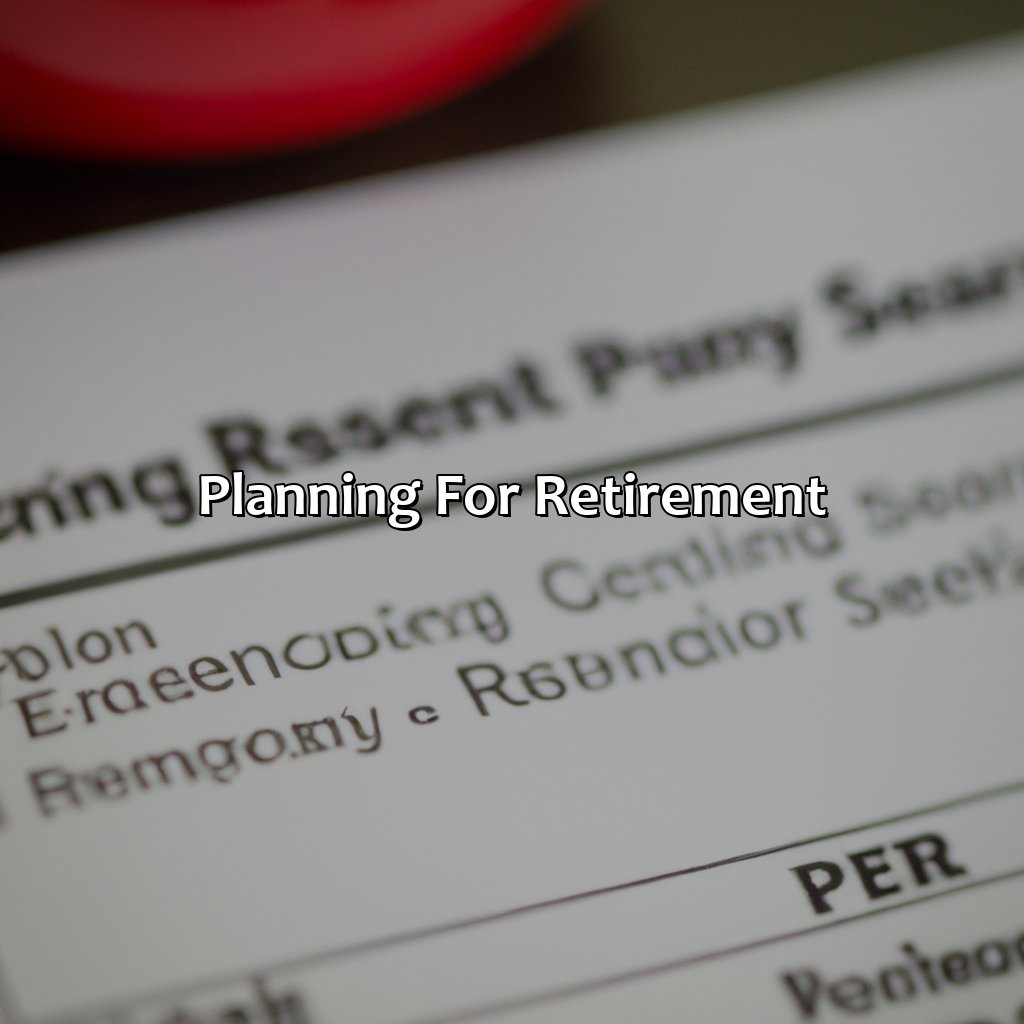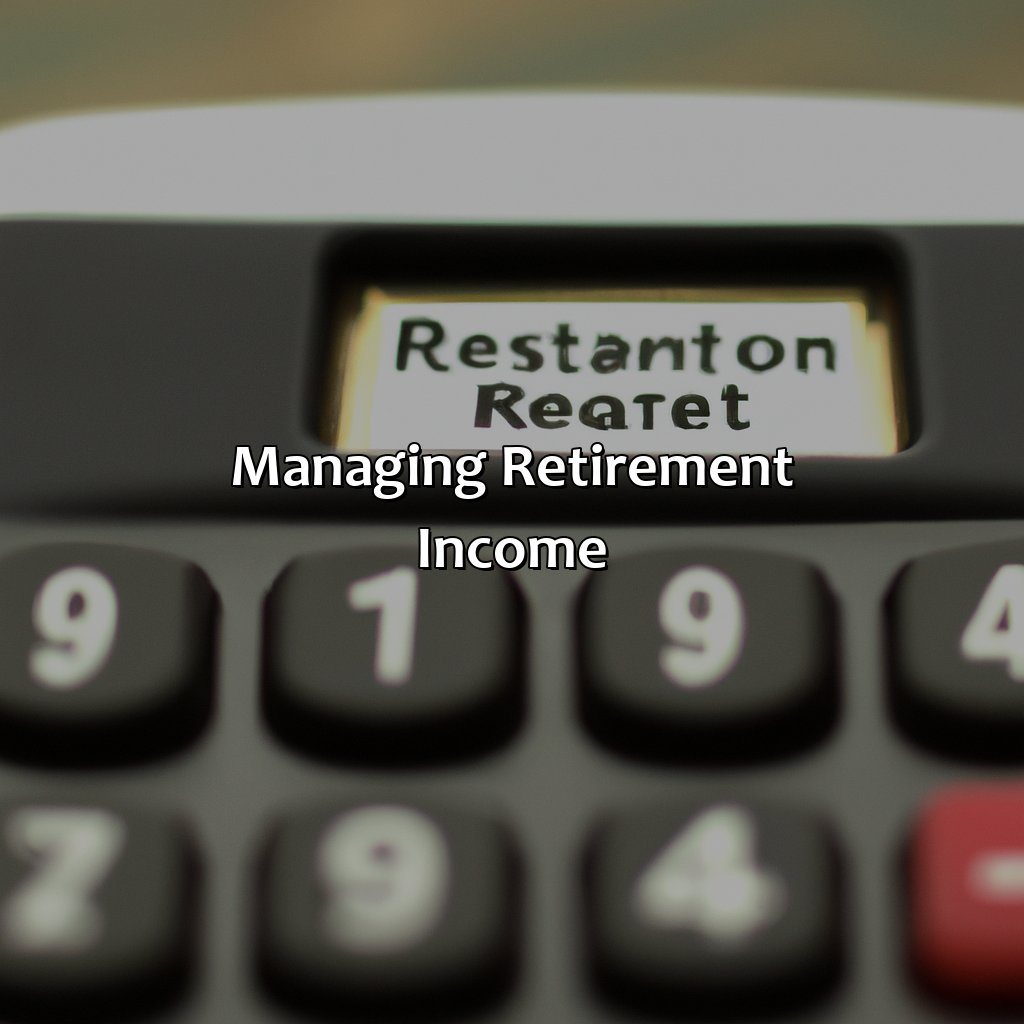Why Will You Need Slightly More Income In Each Year Of Your Retirement?
Key Takeaway:
- Life expectancy increase: As people are living longer, retirees will need slightly more income in each year of their retirement to support their longer lifespan.
- Inflation rates rise: With inflation rates increasing over time, retirees may need more income to maintain their standard of living and cover their financial needs.
- Health care costs climb: Healthcare expenses are likely to increase with age, making it important for retirees to plan ahead and allocate additional funds for potential medical costs.
Are you concerned about having enough income during retirement? Having enough money for retirement means more than just having a nest egg. You need to plan for your income needs, so you can live comfortably and worry-free each year. Find out why you will need slightly more income in each year of your retirement.
Why Retirement Income Needs Increase
Plan ahead for your retirement! To tackle future challenges, you need a plan. This section, ‘Why Retirement Income Needs Increase‘, has sub-sections like:
- Life Expectancy Increases
- Inflation Rates Rise
- Health Care Costs Climb
- Increase in Leisure and Travel Expenses
- Unexpected Expenses
It will help you plan for your future by outlining factors that can affect your retirement income needs.

Image credits: retiregenz.com by James Duncun
Life Expectancy Increases
With the advancements in medical science, people are living longer than before, resulting in the need for increased retirement income. The longevity of individuals has led to higher expenses and healthcare costs, which can put a strain on retirement savings. To sustain these costs over an extended period, retirees require more income than they did previously.
As life spans continue to increase, retirees will need to be financially prepared to support themselves for a more extended period. Retirees who planned their finances based on average life expectancies may find themselves running out of funds faster as they outlive their assets due to increased life expectancy.
It is essential for retirees to plan for an adequate retirement income that can cover any unforeseen circumstances that could arise in their golden years. One way for retirees to address this challenge is by downsizing their expenses and being wise about their spending habits. Another option would be investing in financial vehicles that provide greater returns without significantly increasing risk.
In sum, it is crucial for retirees to understand the impact of increased longevity on their finances and plan accordingly. With advances in medical technology expected to continue driving up life expectancy rates, planning ahead is critical for maintaining a comfortable standard of living well into one’s golden years. As inflation rates rise, so does the cost of living, which means you’ll have to budget for more than just bingo nights and early-bird specials in retirement.
Inflation Rates Rise
As Inflationary Pressures Grow, Retirement Income Needs Increase
As inflation continues to rise, it is essential to consider its impact on the financial security of retirees. With increased living expenses, retired individuals will need to account for higher retirement income needs in each year of their retirement. Failure to do so could result in a significant shortfall and lower standards of living.
The rising cost of goods and services can be attributed to several factors like supply chain disruptions, increased demand, or even changes in government policies. Whatever the cause may be, it underscores the need to factor in inflation rates in retirement planning.
Retirees must ensure that their investment portfolios are adjusted with inflation rates so they can maintain their purchasing power. This helps them keep up with daily expenses while still having some cushion for other discretionary expenses.
Pro Tip: Allocating your portfolio towards investments such as TIPS (Treasury-Indexed Securities) or dividend-paying stocks can help safeguard against inflation over time while ensuring a steady source of income.
Retirement may sound appealing, but it’s not so great when you’re spending all your extra income on medical bills.
Health Care Costs Climb
As one ages, medical expenses become a significant financial concern. Health care expenditure rises rapidly in retirement, and as a result, retirees need to have slightly more income every year to account for these escalating costs.
The trend continues to hold as we age. Elderly individuals need more medical attention, which makes healthcare costs even more expensive during the later stages of retirement. To maintain a comfortable standard of living and avoid financial hardships associated with high healthcare expenses, it is crucial to plan accordingly.
Even with proper planning, seniors may face significant out-of-pocket costs that can wreak havoc on their budgets. According to AARP’s 2021 report, Fidelity’s Health Care Cost Estimate found that the average couple retiring at age 65 should anticipate spending roughly $300,000 on medical bills over their lifetimes – this number does not include long-term care expenses.
AARP suggests that individuals should prepare by budgeting for potential health care costs early in life and taking measures like maximizing insurance coverage or contributing to tax-deferred accounts that can help fund future health care needs.
Retirement: the time when you finally have the money to travel, but not the energy to do it on a budget.
Increase in Leisure and Travel Expenses
As you age, your desire to explore and travel increases, leading to an escalation in leisure and travel expenses. This change in lifestyle leads to higher costs as you wish to fully enjoy your retirement years.
Leisurely activities such as dining out with friends, attending concerts or events can cause a substantial increase in spending. Travelling adds extra costs including airfare and accommodation. It is common for retirees to plan multiple trips each year, raising expenses significantly.
It’s important to note that price inflation has an impact on these expenses over time which compounds the effect. Without proper planning, it could hinder your ability to maintain your standard of living in the future.
To combat this problem, one should consider traveling during off-peak seasons or taking advantage of discounts offered by travel websites. You might also look at travelling locally rather than internationally as it could save you money while still providing a change of scenery.
Retirement: where unexpected expenses are just a polite way of saying ‘oops, I forgot to save for that.'”
Unexpected Expenses
Unexpected Financial Obligations
During retirement, unforeseen financial responsibilities can arise, necessitating an increase in retirement income. Such obligations may include a medical emergency, home repairs or modifications, or even travel expenses for family events. These unexpected expenses can lead to stress and anxiety if not planned for.
As you plan your retirement income, it is essential to take into account unplanned expenditures that may occur in the future. Even with good planning, one cannot predict what will happen. Therefore, it would be wise to set aside a contingency fund that can cover any unforeseen costs that come up. Keeping a cushion of cash will help you weather any financial emergencies comfortably.
It is crucial to budget for unexpected expenses as they can create an imbalance in your savings. Being prepared will reduce stress and ensure that you maintain your standard of living during difficult times. It is vital to keep track of recurring bills such as insurance premiums and other ongoing costs.
To manage surprising expenses better, consider purchasing adequate insurance coverage and reviewing your policies annually. Trustworthy professional advisors would give additional guidance on managing large sums of money and investments wisely. By having a sound approach towards managing unexpected financial obligations during retirement, retirees can enjoy their golden years without worry or monetary insecurity.
Just remember, the earlier you start planning for retirement, the more time you’ll have to perfect your golf swing.
Planning for Retirement
Retirement planning is essential. Knowing the best strategies to increase your income is key. In this section, we’ll go over solutions to these issues. This includes consulting with retirement professionals. Planning for a secure financial future is important. Consider the factors that affect your income needs!

Image credits: retiregenz.com by Harry Woodhock
Importance of Retirement Planning
Retirement Planning is crucial to ensure you have a comfortable lifestyle after your working years are over. A well-structured plan helps in creating a financial roadmap, estimating future expenses and preparing for emergencies.
One of the essential factors to consider while devising your retirement plan is that inflation increases every year, leading to an increase in the cost of living. This means that you will need slightly more income each year of your retirement compared to the previous year. Therefore, it is essential to save and invest wisely.
To make sure you have enough funds for every phase of your retirement, you can use various financial tools such as mutual funds, fixed deposits, or systematic investment plans (SIP). Additionally, it would be best to consider additional sources of income in post-retirement life.
Supplementary streams of revenue could come from part-time work opportunities or investments in real estate. These will not only provide financial stability but also help keep you active mentally and physically during your golden years. The bottom line is that careful retirement planning with realistic expectations can secure your future and prevent unpleasant surprises in the later stages of life.
Why not just retire on a desert island and live off coconuts? Oh, right, inflation.
Consideration of Factors Affecting Income Needs
When calculating retirement income needs, it is essential to consider numerous factors that can impact the amount required. These include inflation rates, healthcare expenses, and lifestyle changes. A diligent approach to financial planning should incorporate projections based on individual circumstances such as assets, goals, and life expectancy. By assessing these factors accurately, one can plan for inflation-adjusted income needs in each year of their retirement.
To ensure adequate income during retirement years, it is crucial to evaluate not only current expenses but also understand how they may change over time. Projections should also include allowances for unexpected events that may arise. The impact of inflation must be considered carefully when planning for retirement as it could significantly erode purchasing power over time. This consideration highlights the importance of designing a diversified investment portfolio that delivers returns above the rate of inflation.
A balanced approach to creating an income stream for retirement years includes exploring various solutions. For instance, annuities protect against longevity by providing a guaranteed income stream until death while Social Security provides a lifetime benefit that adjusts with the cost of living index. Maximizing contributions to 401(k) and other employer-sponsored plans should also be considered to increase overall savings for retirement.
Retirement income doesn’t grow on trees, but with the right strategies, you can make it rain.
Strategies to Increase Retirement Income
Retirement Income Maximization Techniques
To increase your retirement income, there are a variety of tactics you can embrace. These tips will help facilitate the extension of your retirement funds for a longer period of time:
- Focus on paying off all debts before retiring.
- Investing in annuities might be advantageous.
- Stay invested in the stock market despite its volatility.
- Create additional revenue sources after retiring, such as leasing out property or offering consulting services.
- Downsizing to a smaller home can save money and release excess equity from previous homes.
Other Considerations
Keep an eye on interest rates when creating financial goals for post-retirement life. This vital aspect may influence how much money you’ll need in the future. It’s also critical to stick to a budget and living modestly while still enjoying life.
It is worth noting that charitable donations should be included in any retirement plan budget allocation, particularly since it aids individuals with tax benefits throughout their lifetimes.
True Fact:
According to Forbes report (2021), more than 50% of workers aged 55 and above leave their careers due to health issues, not due to retirement plans.
Consulting with retirement specialists is like going to the dentist – it may be painful, but it’s necessary to avoid a future filled with rotten finances.
Consultation with Retirement Specialists
Seeking Expert Advice for Retirement Plan
Getting expert advice on retirement planning is crucial to ensure a comfortable and stress-free retired life. Consultation with retirement specialists is highly recommended to avoid any financial instability in old age.
Specialists at renowned financial institutions can help create tailored retirement plans, offering necessary guidance on funds allocation, investment strategies, and ways to minimize expenses. This ensures that retirees have enough funds to last their lifetime, considering inflation and unforeseen expenses.
It’s essential to consult qualified retirement experts who can offer unbiased advice. After discussing your goals and financial priorities, they can help you decide the best investment options aligned with your objectives.
Retirement income management is like trying to balance a seesaw with a bag of money on one end and a pile of bills on the other.
Managing Retirement Income
To manage retirement income well, budgeting and investment plans that boost income are key. In this section on “Managing Retirement Income,” we will learn the advantages of picking suitable retirement plans. Plus, we’ll see how to assess regularly your retirement income needs.

Image credits: retiregenz.com by Adam Jones
Budgeting Retirement Income
Managing Retirement Funds – why a gradual increase in income is necessary during retirement?
Retirees will need slightly more income every year. This is due to the increase in the cost of living, healthcare expenses, and inflation. Planning for retirement funds early on can help secure a comfortable life post-retirement.
To ensure a financially sound future, retirees must be careful with their budgets. They must adhere to certain principles like withdrawal rate, goal-based planning, and tax-deferred retirement accounts. In addition to this, they should consider investing some of their savings into low-risk investments.
Retirees should also avoid overspending during their initial years of retirement as it can create cash flow issues later on. Furthermore, setting aside contingency funds and regularly reviewing plans ensures that there is sufficient money available throughout the golden years.
A retiree who planned well recounted how he was able to cope with an unexpected downturn by keeping his expenses within budget limits. He achieved his dream trip while still remaining within budget by staying in rental apartments instead of hotels and searching for alternative transportation modes. Through these small sacrifices, he was able to maintain cash flow without halting any other plans for the future.
Retirement is like a game of Jenga, you gotta keep adding blocks of income to avoid the whole thing crashing down.
Investment Plans to Increase Income
Investing for Retirement Income Growth
To increase retirement income, strategic investment planning can ensure a stable and reliable revenue source. Here are three effective ways to increase income after retirement:
- Consider investing in dividend stocks as they provide consistent payouts and are relatively low risk.
- Annuities guarantee regular payments for life, creating long-term security, even in unstable markets.
- Using mutual funds, one can diversify their portfolio with a mixture of dividends and capital gains that can assist in increasing overall returns.
Overall investing strategies should optimize your portfolio for growth, preventing a shortfall later on when expenses may rise.
Did you know? The National Institute on Retirement Security reports nearly half of all Americans aged 55-64 have no retirement savings.
Retirement plans are like diets, you have to pick the one that fits your lifestyle but also leaves room for dessert.
Choosing the Right Retirement Plan
Retirement is a crucial stage of life, and selecting the appropriate retirement plan plays a vital role in choosing the Right Retirement Plan.
- Determine your financial and retirement goals
- Explore various types of plans available
- Consider investment options and fees
- Evaluate the tax implications of each plan
- Consult a financial professional for an informed decision
To maximize your benefits post-retirement, it is essential to select a retirement plan that suits your needs. However, apart from considering the above points, you should factor in other parameters like future changes in lifestyle, market fluctuations, etc., as they affect your finances.
According to sources at Forbes, around 60% of Americans do not have enough funds to retire comfortably. Therefore, it is better to start saving early and choose the right retirement plan without any delays.
You thought budgeting was a pain during your working years? Wait till you have to do it with a fixed income and aching joints.
Regular Assessment of Retirement Income Needs
It is crucial to regularly evaluate your retirement income requirements, as they can change over time due to inflation and other factors. By assessing your needs frequently, you can ensure that you have sufficient funds for your entire retirement. It’s essential to note that you may need slightly more income in each year of retirement. The reason behind this is the increase in living costs due to inflation.
To maintain a comfortable lifestyle, it is necessary to update your retirement plans continually. You may want to consider consulting a financial advisor or using advanced planning tools such as Monte Carlo simulations or safe withdrawal rate analysis for better accuracy.
Understanding the significance of funding limitations during retirement ensures you can make informed decisions when preparing for it. Assessing potential situations on market fluctuations, medical expenditures and risks can help you better identify individual needs during different stages of life.
A retiree we knew stayed fit and active through his seventies but incurred costly medical bills towards his eighties. As a result, he had to pay higher medical expenses instead of enjoying planned activities like travel, during his golden years. Failure to evaluate finances regularly led him into an uncomfortable situation which highlights the importance of periodic reviews of your post-retirement funds.
Some Facts About the Need for Slightly More Income Each Year of Retirement:
- ✅ Inflation is a major reason why retirees need slightly more income every year. (Source: The Balance)
- ✅ Healthcare costs tend to increase with age, which can result in a greater need for retirement income. (Source: Investopedia)
- ✅ Many retirees will spend more at the start of retirement as they pursue travel or other leisure activities. (Source: Kiplinger)
- ✅ People are living longer, meaning that retirement savings must stretch further than in the past. (Source: CNBC)
- ✅ A decrease in Social Security benefits compared to pre-retirement income can also contribute to the need for slightly more income in retirement. (Source: AARP)
FAQs about Why Will You Need Slightly More Income In Each Year Of Your Retirement?
Why will you need slightly more income in each year of your retirement?
There are several reasons why you may need slightly more income in each year of your retirement:
- Inflation: Over time, the purchasing power of your money will decrease due to inflation. That means you may need more money to maintain the same standard of living.
- Healthcare costs: Healthcare costs tend to rise as you age, especially in your later years. You may need more money to cover medical expenses.
- Travel: Many retirees want to travel and see more of the world during their retirement. This can be expensive, especially if you want to take longer trips or go to more exotic locations.
- Hobbies and activities: Retirees often take up new hobbies and activities that can be pricey. For example, you may want to take up golf or pursue a passion for photography.
- Housing costs: Depending on where you live, housing costs can rise over time. Even if you own your home outright, property taxes and maintenance costs can increase.
- Unexpected expenses: Finally, you may need more money in retirement to cover unexpected expenses, such as home repairs or a family emergency.








